Asian American and Native Hawaiian/Pacific Islander Heritage Month, May 2021
Departmental News
Posted: May 03, 2021 - 12:00pm
The UNM Department of Anthropology celebrates Asian American and Native Hawaiian/Pacific Islander Heritage Month, May 2021. The red links below will take you to more information.
About Asian American and Pacific Islander Heritage Month (also known as Asian American and Native Hawaiian/Pacific Islander Heritage Month)
"In 1978, a joint congressional resolution established Asian/Pacific American Heritage Week. The first 10 days of May were chosen to coincide with two important milestones in Asian/Pacific American history: the arrival in the United States of the first Japanese immigrants (May 7, 1843) and contributions of Chinese workers to the building of the transcontinental railroad, completed May 10, 1869. In 1992, Congress expanded the observance to a month-long celebration that is now known as Asian American and Pacific Islander Heritage Month." Read more
President Joe Biden issues A Proclamation on Asian American and Native Hawaiian/Pacific Islander Heritage Month, 2021 (April 30, 2021)
"This May, during Asian American and Native Hawaiian/Pacific Islander Heritage Month, we recognize the history and achievements of Asian Americans, Native Hawaiians, and Pacific Islanders (AANHPIs) across our Nation. In the midst of a difficult year of pain and fear, we reflect on the tradition of leadership, resilience, and courage shown by AANHPI communities, and recommit to the struggle for AANHPI equity. Asian Americans, and Native Hawaiians, and Pacific Islanders make our Nation more vibrant through diversity of cultures, languages, and religions. There is no single story of the AANHPI experience, but rather a diversity of contributions that enrich America’s culture and society and strengthen the United States’ role as a global leader. The American story as we know it would be impossible without the strength, contributions, and legacies of AANHPIs who have helped build and unite this country in each successive generation. From laying railroad tracks, tilling fields, and starting businesses, to caring for our loved ones and honorably serving our Nation in uniform, AANHPI communities are deeply rooted in the history of the United States." Read the full proclamation on the White House website
The National Parks Service Celebrates Asian American and Native Hawaiian/Pacific Islander Heritage Month, May 2021
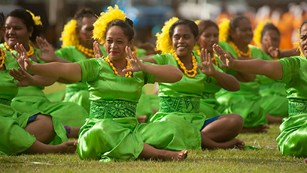 "Asian Americans and Pacific Islanders have a rich heritage thousands of years old and have both shaped the history of the United States and had their lives dramatically influenced by moments in its history. Every May during Asian Pacific American Heritage Month and throughout the year, the National Park Service and our partners share those histories and the continuing culture thriving in parks and communities today." Visit the National Parks website to watch interviews and learn more
"Asian Americans and Pacific Islanders have a rich heritage thousands of years old and have both shaped the history of the United States and had their lives dramatically influenced by moments in its history. Every May during Asian Pacific American Heritage Month and throughout the year, the National Park Service and our partners share those histories and the continuing culture thriving in parks and communities today." Visit the National Parks website to watch interviews and learn more
The Archaeology of Chinese Railroad Workers at Golden Spike National Historic Site
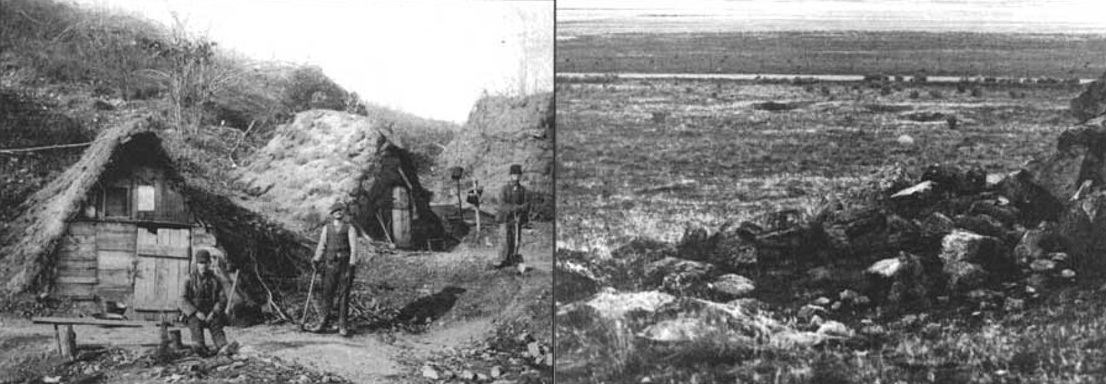 "On May 10, 1869, during an elaborate ceremony at Promontory Summit in Utah, the “Golden Spike” was driven in and the nation’s first Transcontinental Railroad was completed. Newspapers of the time highlighted the corporate “race to Promontory” and technological advancement, and many acknowledged the significant contribution Chinese laborers made to the project. However, these were all second-hand accounts. The voices of the approximately 11,000 Chinese workers who labored on the Railroad faded or were left out entirely. Their day-to-day experiences help tell the full story of how this incredible engineering feat was accomplished." Read more on the Golden Spike National Historic Park website
"On May 10, 1869, during an elaborate ceremony at Promontory Summit in Utah, the “Golden Spike” was driven in and the nation’s first Transcontinental Railroad was completed. Newspapers of the time highlighted the corporate “race to Promontory” and technological advancement, and many acknowledged the significant contribution Chinese laborers made to the project. However, these were all second-hand accounts. The voices of the approximately 11,000 Chinese workers who labored on the Railroad faded or were left out entirely. Their day-to-day experiences help tell the full story of how this incredible engineering feat was accomplished." Read more on the Golden Spike National Historic Park website
Japanese-American Internment during World War II
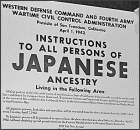 "In his speech to Congress, President Franklin Delano Roosevelt declared that the Japanese attack on Pearl Harbor on December 7, 1941, was "a date which will live in infamy." The attack launched the United States fully into the two theaters of World War II. Prior to Pearl Harbor, the United States had been involved in the European war only, by supplying England and other anti-fascist countries of Europe with munitions. The attack on Pearl Harbor also launched a rash of fear about national security, especially on the West Coast. In February 1942, just two months later, President Roosevelt, as commander-in-chief, issued Executive Order 9066 that resulted in the internment of Japanese Americans. The order authorized the Secretary of War and military commanders to evacuate all persons deemed a threat from the West Coast to internment camps, that the government called "relocation centers," further inland." Read more about this historic injustice at the National Archives and visit photographer Patrick Nagatani's website to see images of internment sites
"In his speech to Congress, President Franklin Delano Roosevelt declared that the Japanese attack on Pearl Harbor on December 7, 1941, was "a date which will live in infamy." The attack launched the United States fully into the two theaters of World War II. Prior to Pearl Harbor, the United States had been involved in the European war only, by supplying England and other anti-fascist countries of Europe with munitions. The attack on Pearl Harbor also launched a rash of fear about national security, especially on the West Coast. In February 1942, just two months later, President Roosevelt, as commander-in-chief, issued Executive Order 9066 that resulted in the internment of Japanese Americans. The order authorized the Secretary of War and military commanders to evacuate all persons deemed a threat from the West Coast to internment camps, that the government called "relocation centers," further inland." Read more about this historic injustice at the National Archives and visit photographer Patrick Nagatani's website to see images of internment sites
The National Museum of American History: Asian Pacific American History
"Asian Americans and Pacific Islanders can trace their histories to a region that spans more than half the globe. They have played key roles in shaping America's past, leaving an enduring impact in areas such as work, politics, culture, and law. They have done so as immigrants, sojourners, settlers, refugees, citizens, aliens, U.S. nationals, and members of overthrown sovereign kingdoms. Join us in exploring the rich and complex histories of Asian Americans and Pacific Islanders through NMAH's collections, exhibitions, archives, and scholarly research."
The Federal Asian Pacific American Council Announces 2021 AAPI Heritage Theme "Advancing Leaders through Purpose-Driven Service"
The Federal Asian Pacific Ameridan Council "FAPAC is proud to select the theme for the observance of Asian American Pacific Islander Heritage Month in May 2021 is Advancing Leaders Through Purpose-Driven Service. This year's theme is the start of the new theme series for 2021-2024 highlighting FAPAC’s efforts in “Advancing Leaders” Read the Press Release
An Archaeologist on the Railroad of Death (Dr. Cyler Conrad, UNM PhD, 2018)
"As a millennial, born in 1989, I grew up with a fascination of wars past, especially movies about World War II. Nothing quite stood out like The Bridge on the River Kwai and the human experience it portrayed. It is only now, as an anthropologist and archaeologist who has conducted research in Thailand and mainland Southeast Asia, that I recognize the intersection between this film, the history of World War II, and archaeological developments within this region. David Lean’s 1957 Hollywood film adaptation of the 1952 novel The Bridge on the River Kwai was a hit. It won seven academy awards and was well-received by the public. The tale is loosely based around real events and people. But it alters the timeline and glosses over the truly horrific experience of prisoners of war—even though the production crew and cast did experience their own bouts of dysentery, leeches, monsoon rains, oppressive heat, and accidental deaths while filming on location in Sri Lanka. The cinematic version was still kinder than the reality." Read the full article
Artist Argus Paul Estabrook Developes Documentary I AM NOT A VIRUS
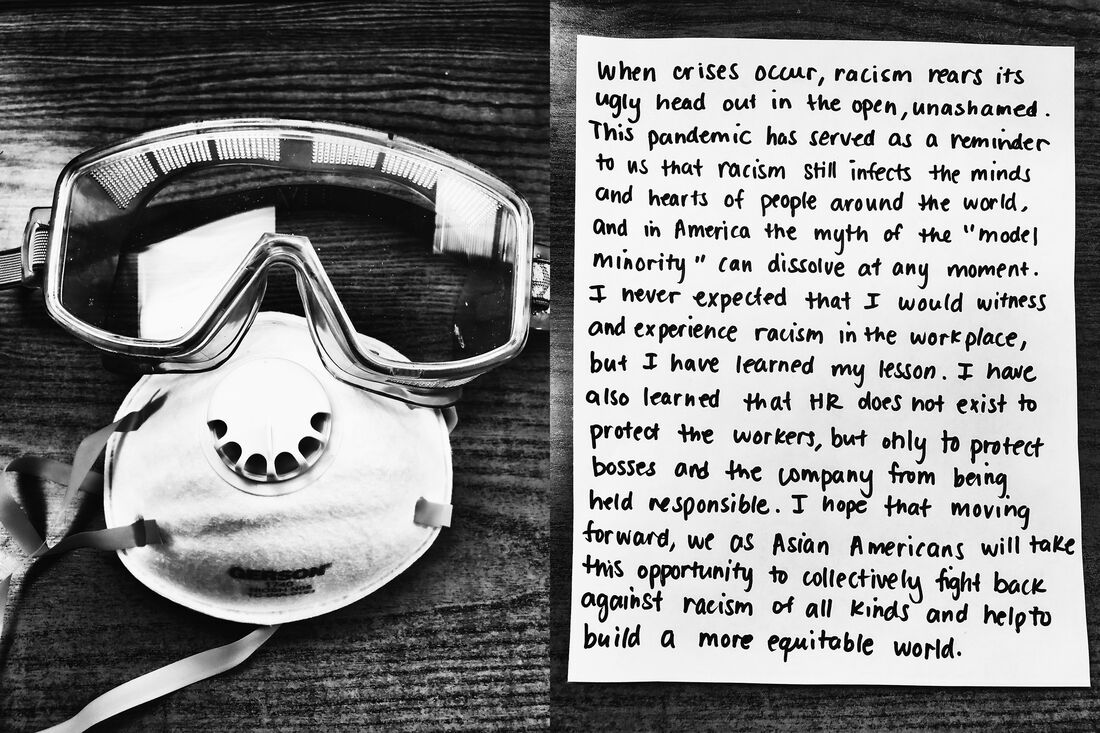 In collaboration with the Asian American Association of New Mexico, Korean American artist Argus Paul created a documentary project to share their thoughts and experiences in the wave of increased anti-Asian sentiment related to COVID-19. "As a Korean-American artist, I wanted to make a space for people of Asian descent to candidly express their thoughts and experiences. In early April 2020, I reached out to the Asian American Association of New Mexico to help create a collaborative documentary project, I Am Not a Virus. Defined by the restrictions of the pandemic itself, we invited participants to submit self-captured images and writings, which were then processed together to create a series of intimate, narrative-based portraiture. For the sake of anonymity, many participants chose to use pseudonyms." Visit his website to view the images and stories
In collaboration with the Asian American Association of New Mexico, Korean American artist Argus Paul created a documentary project to share their thoughts and experiences in the wave of increased anti-Asian sentiment related to COVID-19. "As a Korean-American artist, I wanted to make a space for people of Asian descent to candidly express their thoughts and experiences. In early April 2020, I reached out to the Asian American Association of New Mexico to help create a collaborative documentary project, I Am Not a Virus. Defined by the restrictions of the pandemic itself, we invited participants to submit self-captured images and writings, which were then processed together to create a series of intimate, narrative-based portraiture. For the sake of anonymity, many participants chose to use pseudonyms." Visit his website to view the images and stories
Asian American and Pacific Islander Heritage Month Site from the National Archives
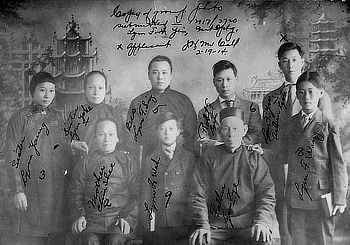 "The National Archives holds a wealth of material documenting the Asian and Pacific Islanders experience, and highlights these resources online, in programs, and through traditional and social media." They have developed a website for Asian Pacific American Heritage Month featuring articles, images, and video. Visit the site
"The National Archives holds a wealth of material documenting the Asian and Pacific Islanders experience, and highlights these resources online, in programs, and through traditional and social media." They have developed a website for Asian Pacific American Heritage Month featuring articles, images, and video. Visit the site
The National Archive Asian Pacific American Heritage Month site provides access to a variety of exhibits, documents and information. Explore a variety of artworks made by Asian American artists from the National Gallery of Art's collection. The artworks include paintings, prints, photographs, sculptures, and drawings, and range from the early 20th century to today. There are also video and audio collections.
Resources
UNM Anthropology stands in support of our Asian and Pacific American community in condemning discimination in all its forms. If you would like to support AAPI communities in this time of crisis, please consider these organizations:
Asian Pacific COVID-19 Relief Fund
Asian Authors Alliance Book Month
"On the heels of its successful Kidlit Against Anti-AAPI Racism Fundraiser, which raised more than $53,000 to fight anti-AAPI racism this past February, Asian Authors Alliance has announced its second annual AAPI Book Month. The slate of virtual events featuring Asian American and Pacific Islander children’s book creators will kick off in May, which the United States designates as Asian American and Pacific Islander Heritage Month, and will be streamed viaYouTube and Instagram Live." Read more
Manvir Singh presents The Nature and Origins of Religious Super-Attractors
Manvir Singh is a Post-doctoral Research Fellow at the Institute for Advanced Study in Toulouse, France. He received his PhD from the Department of Human Evolutionary Biology at Harvard University in May 2020. His research examines the social, cognitive, and cultural evolutionary foundations of complex cultural traditions that reliably emerge across human societies, such as music, narrative, shamanism, and institutions of justice. Since 2014, he has conducted fieldwork among the Mentawai of Siberut Island, Indonesia.
April Kamp-Whittaker presents Networks at Play
April Kamp-Whittaker presents "Networks at Play: Sports and the Archaeology of Community in a WWII Japanese American Incarceration Center." Dr. Kamp-Whittaker is a Postdoctoral Fellow in the Department of Anthropology at the University of New Mexico and Co-field Director of the University of Denver Amache Project. Her research at Amache, a WWII Japanese American Incarceration Center, has focused on the archaeology of community and the development of social networks and neighborhoods. She has worked on historical and prehistoric projects across the U.S. and tries to find new ways to connect audiences to archaeology through public presentations, exhibits, and curriculum.
Katherine Peck presents The South Kohala Field System: Ancient Management, Modern Resilience
Katherine Peck received her B.A. in Anthropology from William & Mary in 2017 and her M.S. in Anthropology from the University of New Mexico in 2019. She is currently pursuing her PhD in Anthropology at UNM, where her doctoral research focuses on using geoarchaeological and geospatial methods to examine agricultural strategies on the leeward side of Kohala, Hawai'i Island.
News
House Passes Bill to Counter Rise in Anti-Asian Hate Crimes (5/18/2021)
"The House voted overwhelmingly Tuesday [May 18, 2021] to pass legislation intended to counter a rise in anti-Asian hate crimes amid the coronavirus pandemic.The vote was 364-62 with 62 Republicans voting against it. President Joe Biden has voiced his support for the measure and now that it has passed the House, it will be cleared for his signature.The legislation, known as the COVID-19 Hate Crimes Act, was introduced by Democratic Rep. Grace Meng of New York and Democratic Sen. Mazie Hirono of Hawaii. It passed the Senate by a vote of 94-1 last month."The past year and a half has been one of pain and struggle marked by despicable and sickening acts of hate and violence against the Asian-American community," Meng said at a news conference on Tuesday. "Those of Asian descent have been blamed and scapegoated for the outbreak of Covid-19 and as a result Asian Americans have been beaten, slashed, spat on and even set on fire and killed." The bill would create a new position at the Justice Department to expedite review of potential Covid-19-related hate crimes and incidents reported at the federal, state or local level. It would also direct the departments of Justice and Health and Human Services to work with community-based organizations to issue guidance raising awareness of hate crimes during the pandemic, and would require the US Attorney General to issue guidance to work with state and local law enforcement agencies to establish online reporting of them." Read the full article on CNN
White House Names Erika Moritsugu as Asian American and Pacific Islander Liaison
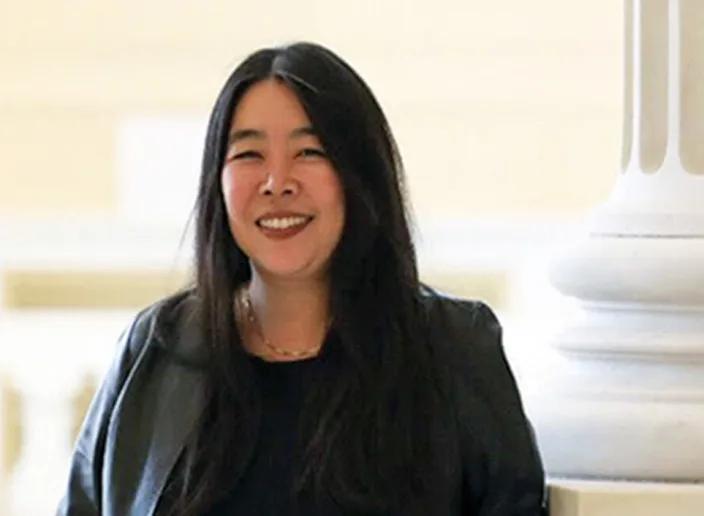 "The White House on [April 14] announced the appointment of Erika Moritsugu as its Asian American and Pacific Islander liaison. Moritsugu was a vice president at the National Partnership for Women & Families, heading up the group’s Economic Justice team. She was also an assistant secretary of housing and urban development during the Obama administration." Read more
"The White House on [April 14] announced the appointment of Erika Moritsugu as its Asian American and Pacific Islander liaison. Moritsugu was a vice president at the National Partnership for Women & Families, heading up the group’s Economic Justice team. She was also an assistant secretary of housing and urban development during the Obama administration." Read more
AAPI Community Reacts to New Memorandum Condemning Racism
"President Biden signed a memorandum in January 2021 condemning racism against Asian Americans and Pacific Islanders (AAPI). Officials said it’s been an ongoing issue throughout the pandemic, stemming from statements made about the virus’ origin. The move comes to protect AAPI communities from bullying, harassment, and hate crimes that have been present in Albuquerque in recent months. The memorandum urges the attorney general to work with state and local agencies to expand data collection about these hate crimes. It also asks organizations to avoid racially discriminatory language in describing the pandemic." Read more
Albuquerque City Councilor Works on Boosting Resources for AAPI Youth
"As more students head back to the classroom, some people are concerned about the added stress students may feel as a result of the spike in hate incidents against the Asian American Community. Some students are already struggling with their mental health due to being isolated during the pandemic. “Specifically looking at our mental and behavioral health, and Asian American Pacific Islander youth reported the highest rates of self harm and thoughts of suicide,” said Albuquerque City Councilor Lan Sena. Sena is working on a resolution that would include funding for a program so the AAPI Community can have access to culturally appropriate services that also address behavioral health." Read more
Reading
The Model Minority Myth
"Since its introduction in popular media more than a half century ago, the term “model minority” has often been used to refer to a minority group perceived as particularly successful, especially in a manner that contrasts with other minority groups. The term could, by its definition and logic, be applied to any number of groups defined by any number of criteria, but it is perhaps most commonly used to frame discussions of race. In particular, the model minority designation is often applied to Asian Americans, who, as a group, are often praised for apparent success across academic, economic, and cultural domains—successes typically offered in contrast to the perceived achievements of other racial groups.
The model minority argument, however, is not without controversy and has earned the labels of stereotype and myth as critics have taken aim at both its premises and conclusions. Many point to the purpose of the argument as disingenuous insofar as it is intended to drive a wedge between different disadvantaged groups. Others claim that it is misleading because performance metrics and even representation figures do not speak to many of the biases that persist today."
Read more on Harvard Law School Center on the Legal Profession website The Practice
Research
Mosuo Health and Demography Project (Dr. Siobhan Mattison)
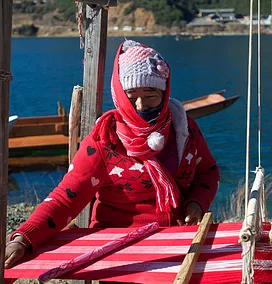 "Since 2006, this project has focused on the health, demography, and social structure of the Mosuo, a Chinese ethnic minority in Yunnan and Sichuan Provinces who practice both male-focused and female-focused forms of kinship in different communities."Read more on the field project webpage
"Since 2006, this project has focused on the health, demography, and social structure of the Mosuo, a Chinese ethnic minority in Yunnan and Sichuan Provinces who practice both male-focused and female-focused forms of kinship in different communities."Read more on the field project webpage
Orang Asli Health and Lifeways Project (OA Help) (Dr. Ian Wallace)
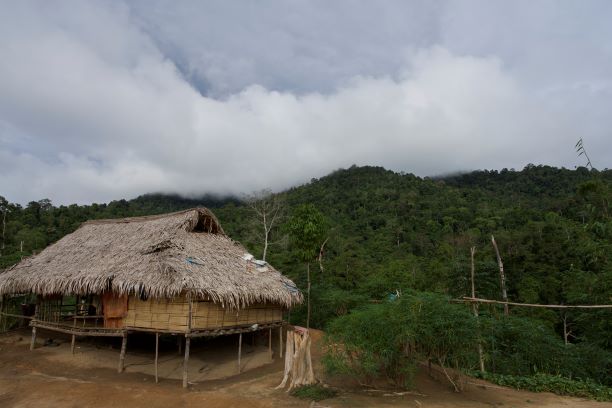 "The Orang Asli Health and Lifeways Project (OA HeLP) is a collaboration between anthropologists and biomedical researchers to study the changing patterns of health and disease among the indigenous peoples of Peninsular Malaysia, collectively known as the Orang Asli." Read more on the field project webpage
"The Orang Asli Health and Lifeways Project (OA HeLP) is a collaboration between anthropologists and biomedical researchers to study the changing patterns of health and disease among the indigenous peoples of Peninsular Malaysia, collectively known as the Orang Asli." Read more on the field project webpage
Vanuatu Health and Demography Project (Dr. Siobhan Mattison)
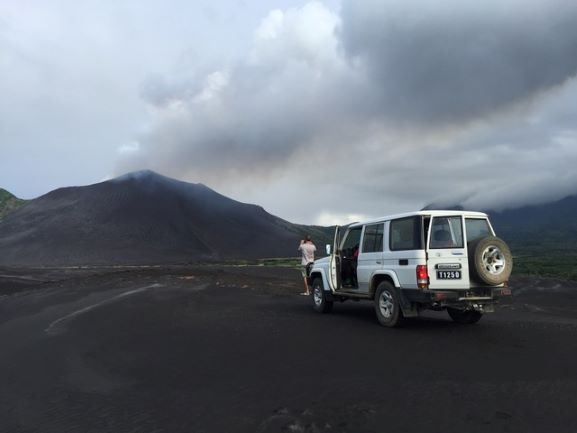 "Since 2016, this project has supported multiple students in investigations of family structure, function, and associations with health and socio-ecology among the Melanesian ni-Vanuatu. Current foci include understanding the effects of market integration on health and demography and investigating the evolutionary significance of adoption and fosterage, practices which are highly prevalent in the local context." Read more on the field project webpage
"Since 2016, this project has supported multiple students in investigations of family structure, function, and associations with health and socio-ecology among the Melanesian ni-Vanuatu. Current foci include understanding the effects of market integration on health and demography and investigating the evolutionary significance of adoption and fosterage, practices which are highly prevalent in the local context." Read more on the field project webpage
Dr. Lewis Binford and Chinese Anthropology (written by Dr. Meng Zhang, UNM PhD, 2019)
Shijia Zhan’s Ph.D dissertation (2018, Jilin University) systematically studied Binford’s visit to China in 1985. Supported by the L.S.B. Leakey Foundation, Dr. Lewis Binford and his then-wife Nancy Stone, and Dr. Chuan Kun Ho and his then-wife Aiguo Wang visited a series of archaeological sites in northern China between May 21st and July 16th, 1985. Their visit was invited by Professor Lanpo Jia at the Institute of Vertebrate Paleontology and Paleoanthropology (IVPP), Chinese Academy of Sciences. Lew presented his research at the IVPP, Shanxi University, Shanxi Normal University, Northwest University, Beijing University, and Harbin. Paleolithic archaeological sites they visited include Zhoukoudian (Beijing), Dingcun (Shanxi), Lantian (Shaanxi), Yanjiagang and Guxiangtun (Heilongjiang). Though the corporative research plan finally failed because of several reasons, including miscommunication and difference of archaeological paradigm between the two countries, it opened a window for the future opportunities. For example, Dr. J. Desmond Clark as a co-working investigator participated the Chinese-American excavation in the Nihewan Basin in 1990. Numerous American Paleolithic archaeologists and Paleoanthropologists visited China and provided courses or talks, such as George Odell, Mary Stiner, Steven Kuhn, Rick Potts, Robert Kelly, etc. Dr. Xing Gao, the head of Paleolithic committee, Chinese society of Archaeology, working at the IVPP, was trained at the University of Arizona and got his PhD there in 1999. Dr. Shengqian Chen, the only PhD under Binford’s supervision (SMU 2004), has translated In Pursuit of the Past into Chinese and continued to inspire students and young scholars to deeply understand Binford’s thoughts and the New Archaeology and apply them into archaeological practice.
Anthropology Organizations Online
Society for East Asian Anthropology (A section of the American Anthropological Society)
Local Organizations
UNM Asian American Student Association
Asian American Association of New Mexico
